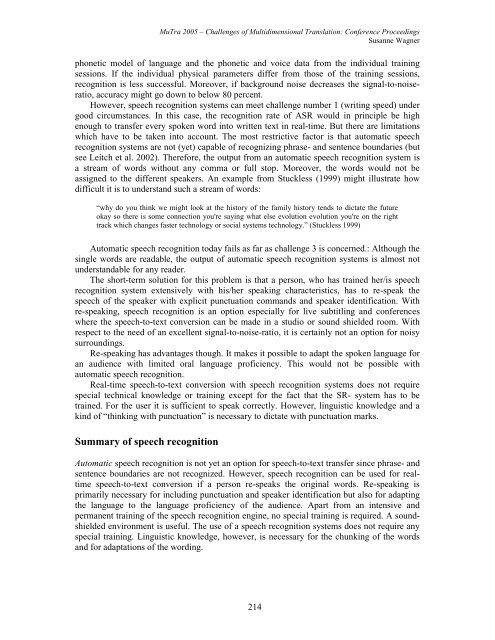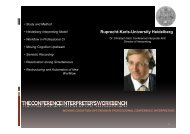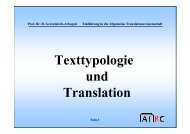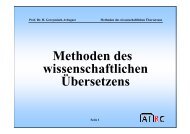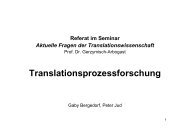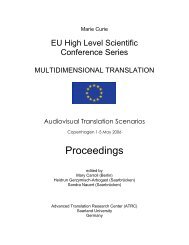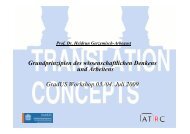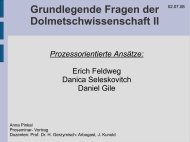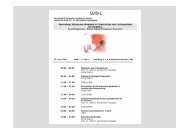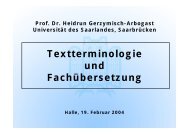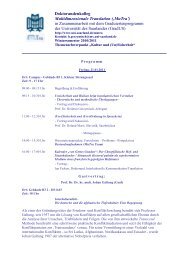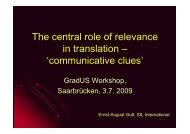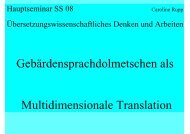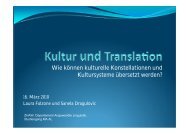Proceedings - Translation Concepts
Proceedings - Translation Concepts
Proceedings - Translation Concepts
You also want an ePaper? Increase the reach of your titles
YUMPU automatically turns print PDFs into web optimized ePapers that Google loves.
MuTra 2005 – Challenges of Multidimensional <strong>Translation</strong>: Conference <strong>Proceedings</strong><br />
Susanne Wagner<br />
phonetic model of language and the phonetic and voice data from the individual training<br />
sessions. If the individual physical parameters differ from those of the training sessions,<br />
recognition is less successful. Moreover, if background noise decreases the signal-to-noiseratio,<br />
accuracy might go down to below 80 percent.<br />
However, speech recognition systems can meet challenge number 1 (writing speed) under<br />
good circumstances. In this case, the recognition rate of ASR would in principle be high<br />
enough to transfer every spoken word into written text in real-time. But there are limitations<br />
which have to be taken into account. The most restrictive factor is that automatic speech<br />
recognition systems are not (yet) capable of recognizing phrase- and sentence boundaries (but<br />
see Leitch et al. 2002). Therefore, the output from an automatic speech recognition system is<br />
a stream of words without any comma or full stop. Moreover, the words would not be<br />
assigned to the different speakers. An example from Stuckless (1999) might illustrate how<br />
difficult it is to understand such a stream of words:<br />
“why do you think we might look at the history of the family history tends to dictate the future<br />
okay so there is some connection you're saying what else evolution evolution you're on the right<br />
track which changes faster technology or social systems technology.” (Stuckless 1999)<br />
Automatic speech recognition today fails as far as challenge 3 is concerned.: Although the<br />
single words are readable, the output of automatic speech recognition systems is almost not<br />
understandable for any reader.<br />
The short-term solution for this problem is that a person, who has trained her/is speech<br />
recognition system extensively with his/her speaking characteristics, has to re-speak the<br />
speech of the speaker with explicit punctuation commands and speaker identification. With<br />
re-speaking, speech recognition is an option especially for live subtitling and conferences<br />
where the speech-to-text conversion can be made in a studio or sound shielded room. With<br />
respect to the need of an excellent signal-to-noise-ratio, it is certainly not an option for noisy<br />
surroundings.<br />
Re-speaking has advantages though. It makes it possible to adapt the spoken language for<br />
an audience with limited oral language proficiency. This would not be possible with<br />
automatic speech recognition.<br />
Real-time speech-to-text conversion with speech recognition systems does not require<br />
special technical knowledge or training except for the fact that the SR- system has to be<br />
trained. For the user it is sufficient to speak correctly. However, linguistic knowledge and a<br />
kind of “thinking with punctuation” is necessary to dictate with punctuation marks.<br />
Summary of speech recognition<br />
Automatic speech recognition is not yet an option for speech-to-text transfer since phrase- and<br />
sentence boundaries are not recognized. However, speech recognition can be used for realtime<br />
speech-to-text conversion if a person re-speaks the original words. Re-speaking is<br />
primarily necessary for including punctuation and speaker identification but also for adapting<br />
the language to the language proficiency of the audience. Apart from an intensive and<br />
permanent training of the speech recognition engine, no special training is required. A soundshielded<br />
environment is useful. The use of a speech recognition systems does not require any<br />
special training. Linguistic knowledge, however, is necessary for the chunking of the words<br />
and for adaptations of the wording.<br />
214


